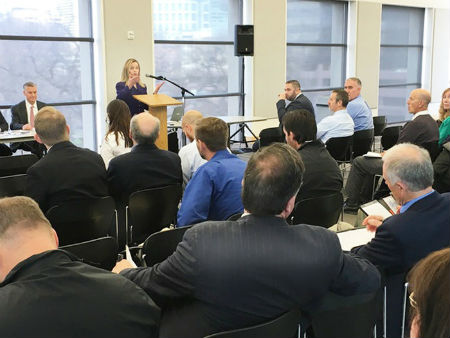When the owners of small businesses feel like they bear too heavy a burden due to unfair or excessive federal regulatory enforcement actions, they just wish someone would listen to their complaints. Recently, members of the Utah business community had just such an opportunity at a hearing at the Salt Lake City library.
When the owners of small businesses feel like they bear too heavy a burden due to unfair or excessive federal regulatory enforcement actions, they just wish someone would listen to their complaints. Recently, members of the Utah business community had just such an opportunity at a hearing at the Salt Lake City library. They had a chance to air their grievances before a panel of federal officials chaired by the U.S. Small Business Administration’s national ombudsman Earl L. Gay.
The SBA’s Office of the National Ombudsman (ONO) holds hearings around the country, hoping to ensure fairness in federal regulatory compliance or enforcement issues such as repetitive audits or investigations, excessive fines, penalties, threats, retaliation or other unfair enforcement action by a federal agency.
Along with representatives from the SBA, there were several other government bodies attending, including representatives from the Internal Revenue Service, U.S. Equal Employment Opportunity Commission and the Centers for Medicare & Medicaid Services. Staffers from the offices of U.S. Sens. Orrin Hatch and Mike Lee and U.S. Reps. Mia Love, Chris Stewart and Jason Chaffetz were also in attendance.
The Regulatory Fairness Hearing allowed an opportunity for business owners to voice concerns about what they felt were regulatory issues involving or caused by federal agencies. In addition, small businesses had a chance to learn more about the resources available from the SBA and its Office of the National Ombudsman. For more than three hours, business owners provided detailed testimony to the panel made up of Gay, SBA Region 8 administrator Betsy Markey, SBA Region 8 regional regulatory fairness board member and former Salt Lake County Mayor Peter Corroon and SBA Region 8 small-business advocate John Hart.
Among the representatives of small businesses that spoke at the hearing were Linda Rossen of Dina Grace Enterprises in Morgan, Matthew R. Bracken of Jenco Medical Utah Prosthetics, Kurt Walker of Mountain Valley Home Medical Equipment, Mark Lopez of Health Watch and Matt Hansen representing the Utah Association for Home Care.
The witnesses were able to spell out their qualms with government-related obstacles to doing business. The panel was not only looking to hear of the problems created by government regulation, but were also looking for solutions. Therefore, the panel asked that each testimony conclude with a recommendation of how to remedy the situation described and questions from panel members to the businesses.
Comments and concerns raised at the forum will eventually be directed by the national ombudsman to the appropriate federal agency for a fairness review in an effort to reduce undue regulatory burdens, according to information distributed by the SBA.
Created by Congress in 1996 through the Small Business Regulatory Enforcement Fairness Act, the SBA Office of the National Ombudsman’s primary function is to work with small businesses and federal agencies to ensure that regulatory or compliance actions are handled and enforced fairly by all federal agencies. The national ombudsman is empowered to receive, substantiate and report to Congress complaints and comments from small business owners regarding regulatory enforcement actions taken against small businesses by federal agencies.
“The National Ombudsman assists small businesses in navigating the seas of federal regulatory enforcement. As time goes on, the trend is moving toward evermore regulations, so it is absolutely crucial that regulatory enforcement be effective — not excessive,” said SBA Utah District Office director Stan Nakano. “Our hope is that the testimony provided by business owners at the recent regulatory fairness hearing will help guide the national ombudsman’s focus as he works to enhance transparency for the businesses owners SBA serves, and strengthen the relationship between the small- business community and the government.”
The National Ombudsman’s office works with 10 regional fairness boards whose membership is composed of 50 small-business owners from across the country. The ONO works closely with more than 35 federal regulatory agencies to resolve complaints about excessive enforcement of federal regulations brought to the attention of the national ombudsman during hearings and roundtables held in cities nationwide.








